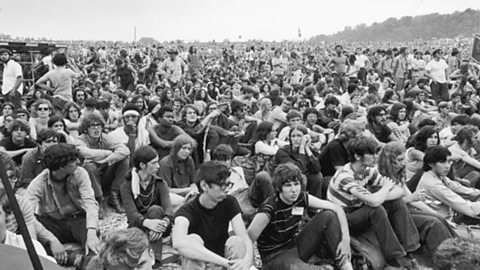The Failure of The Hippie Movement
The nineteen sixties will forever be associated with the hippie movement; the thrust to break free of the shackles of morality. The argument that all pleasure is healthy and that puritanical restraint is toxic is a product of the sixties. It was a time of unrestrained hedonism and the unraveling of decorum. With it came the unbuckling of societal order and the social structure.
The theory was that if a little pleasure, structured and channeled by the guardrails of religion and society, is good, then more pleasure is better. If more pleasure is better, then anything that hampers hedonism is unhealthy. Ergo, social mores and religious values are unhealthy. The god of Eros replaced the G-d of Heaven and earth. They cast off all societal rules and religious yokes, ridiculed every social structure, and rejected every authority. The mantra was do as you please.
How has that worked out for us? It turns out that anarchy doesn’t lead to anything constructive. It only leads to more anarchy until it turns on the very anarchists who let it loose in the first place. Hedonism for the sake of hedonism ultimately fails to satisfy. With time, it fails even to stimulate. It turns out that human nature craves fulfilment and internal satisfaction, which come only from achievement and effort. It comes from meaningful relationships carefully tended and nurtured. It comes from working hard to earn our lot. It comes from helping others, not from pursuing pleasure for its own sake.
Abraham and Lot
When Abraham and his nephew Lot came to Canaan, they encountered a prosperous, hedonistic, and self-absorbed society. The people of Sodom and Gomorrah made a good life for themselves. They built large homes on vast plots in wealthy cities. They enjoyed life to the fullest and refused to share their wealth. The earth was fertile, the land was lush, and the people enjoyed every conceivable pleasure.
Abraham had a different ethic. He used his wealth to establish roadside inns to feed the poor and house wayfarers for free. He used his fame as a megaphone through which to teach people about monotheism and morality. The culture and milieu of Abraham’s home were the very opposite of the culture in Sodom.
Lot was trapped somewhere in between. As Abraham’s nephew, he admired these teachings and ethics. However, as a young man, he was enthralled by the glitter and pleasures of the Sodomites. After a while, he made his choice; he chose hedonism.
Abraham told him that they would need to part ways. If you go right, I will go left. If you go left, I will go right. And this is what they did. Lot moved to Sodom, and Abraham continued on his mission.
The two value systems represented the same choice that confronted the hippie movement in the sixties. Why do we live? What is our purpose? Is it value-based or pleasure-based? Do we live to enjoy, or to serve? Abraham and Lot made their choice, but so do we. Where do we fall, in Abraham’s camp or Lot’s?
Holy and Unholy
In the Torah, G-d tells us that He placed before us good and bad, life and death, and asks us to choose. No one in their right mind would choose bad and death over good and life. What does G-d mean?
One explanation is that there is a little good and a little bit bad in everything. A little bit of life and a little bit of death in everything. Take a bagel, for example. The good in it is the nourishment we get from it. The bad part is that bread can be addictive, so we end up overeating on carbs.
What determines if you eat sparingly or as much as you like? The hippie in you will argue that if a little bit is good, a lot is much better. The values-based person in you will say that a little bit is healthy, but too much will drag you down. On the surface, it sounds so logical, so why do so many struggle with overeating?
The answer is because we eat the first little bit for ourselves. Once we are eating to satisfy a craving, it is hard to stop when another craving arises. The solution is not to eat for ourselves, but for G-d. Even the first bite is not for me. Never for me. Always for G-d. When you eat because G-d wants you to live and serve Him, you eat as much as you need. You don’t eat less than you need because G-d wants you to be healthy. You also don’t overeat because G-d doesn’t want you to be unhealthy.
Eating the bagel for G-d is using the bagel for life and for good. Eating the bagel to satisfy a craving is using the bagel for bad and for death. G-d tells us to choose. That part is up to us. Unrestrained hedonism isn’t good for us. It is a destructive and even deadly choice. Asceticism is also unhealthy. Eventually, it leads us to starvation, which is also a bad choice.
The golden path is balanced and nuanced. Don’t deny yourself pleasure, but don’t indulge in it purely for the sake of pleasure. Don’t let pleasure become your end goal. Don’t live to satisfy your appetites. Serve G-d, not your impulses. Be G-d-centered, not self-centered. This way, you won’t overindulge, nor will you starve yourself. You will eat as much as you need. You won’t enslave yourself to pleasure. Instead, you will use it to refine your body and elevate your world.
The Sign of Recovery
Have you ever noticed that when you are ill, you eat only when you are hungry? You lose your appetite for more, and you are satisfied with less.
Rabbi Menachem Zeev Greenglass of blessed memory was once hospitalized with a severe illness. After a long while, he was finally discharged and recovered enough to attend services at the local synagogue in Montreal.
A student approached him with concern, asking whether he had recovered. Rabbi Greenglass thought for a little while and then replied that he had. Noting his hesitation, the student asked, “Are you sure?” “Yes,” replied the rabbi, “I know it because my yetzer hara (my predilection to indulge) has returned.”
The struggle between Abraham and Sodom is part of the fabric of life. No one is immune to it. If you don’t feel the tug, you are either very holy or very sick. The sign of recovery is that your appetite has returned with a vengeance.
Our role in life is to tame the bucking bronco and let our inner Abraham win. We do that by remaining perpetually conscious of our role and responsibility. Don’t eat for pleasure, eat for G-d. Don’t succumb to what is often described as the tyranny of pleasure. Instead, heed the timeless call: transcend the life of material comfort and self-gratification, and live instead for something higher—for G-d, for goodness, and for meaning.
It is a life-long journey. It is not achieved in a day. But it is the journey that makes life worth living.


























